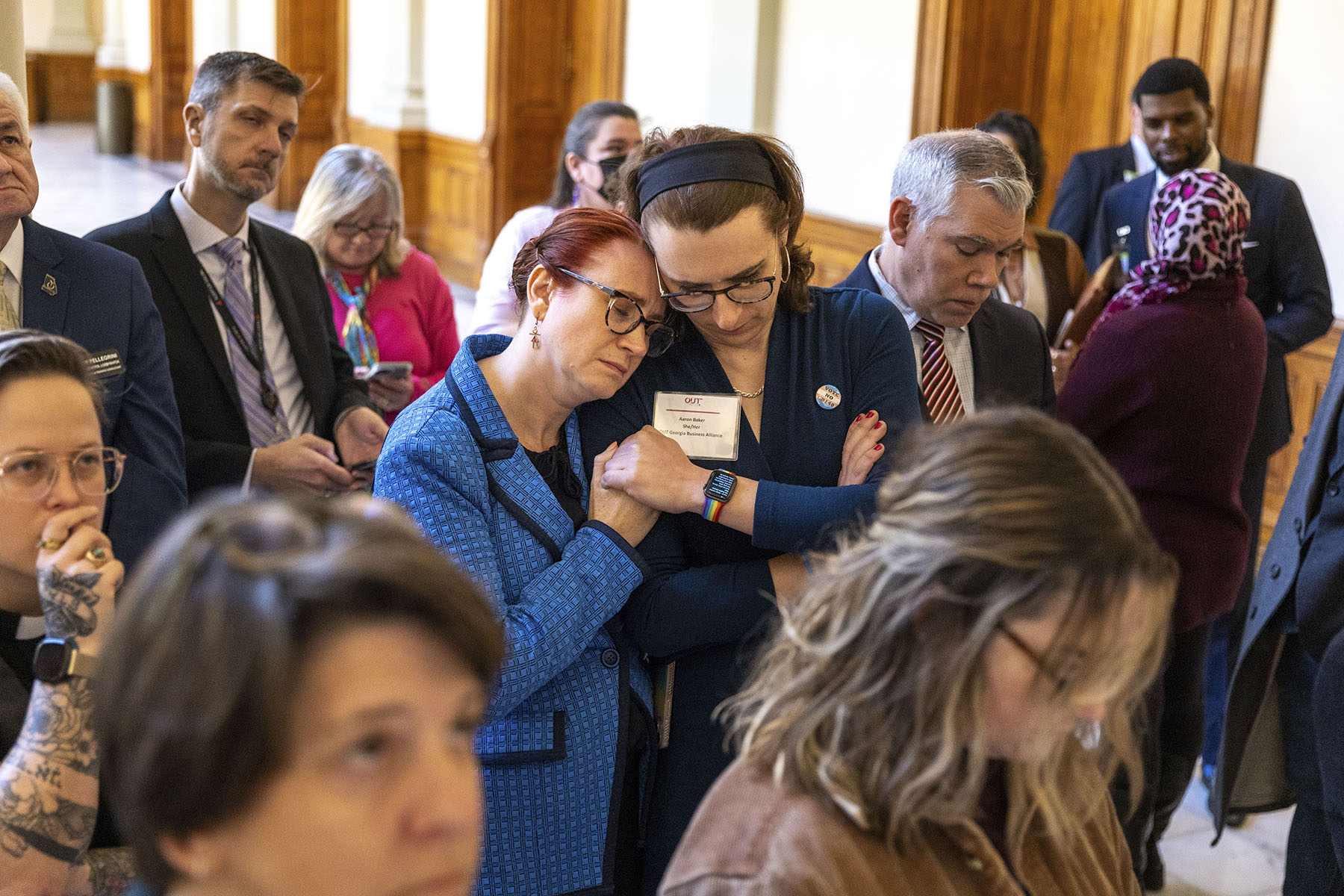Your trusted source for contextualizing the news. Sign up for our daily newsletter.
Three states want to stipulate how, and whether, autistic transgender youth and those with mental health conditions are able to access gender-affirming care — a new tactic aimed at the intersection of two marginalized groups.
Georgia, Arkansas and Missouri enacted policies that either: suggest that the provision of such care should be withheld from autistic people; require doctors to determine whether a patient seeking gender-affirming care has autism; or require doctors to ensure that symptoms of lifelong mental health issues are “resolved” prior to treatment. In Missouri, that policy is no longer in effect after state leadership backed down, and legal action against Georgia’s law is expected.
More states are proposing legislation that questions whether trans youth with any mental health issue — including depression and ADHD — should be able to access care.
Underlying these policies and proposals is an assumption that people with autism are incapable of making decisions about their own gender.
“You get a sense in some quarters that autistic people are especially ill qualified to make big decisions, particularly medical decisions for ourselves or that we have been subjected to some sort of undue influence or social contagion,” said Larkin Taylor-Parker, policy director for the Autistic Self Advocacy Network. “This results in a particularly nasty attack on bodily autonomy and individual rights.”
The Autistic Self Advocacy Network is the largest advocacy organization entirely by and for autistic people in the United States. Parker is transgender, along with around a third of the organization’s staff.
Trans autistic people tell The 19th that the policies and measures highlight how a number of autistic people are part of the transgender and LGBTQ+ community — an intersection that is rarely acknowledged. They say the measures are especially frustrating because it essentially codifies anti-trans rhetoric that portrays them as helpless or unable to make their own medical decisions.
In Georgia, a bill passed into law earlier this year states simply, as part of its reasoning, that gender-affirming care for minors should be banned, because some people with gender dysphoria also have autism or mental health conditions. The law goes into effect on July 1, and the ACLU of Georgia has pledged to sue the state.
In Arkansas, doctors can shield themselves against lawsuits over gender-affirming care if they can prove that their minor patient did not have conditions including autism, depression, ADHD, an eating disorder, an intellectual disability or a psychotic disorder. That bill goes into effect this summer. Meanwhile, advocates are waiting for a final decision in a court case against Arkansas’ 2021 law banning gender-affirming care for trans youth.
Logan Casey, senior policy researcher and adviser for the Movement Advancement Project, which tracks LGBTQ+ legislation, said that these bills represent a new trend in anti-trans state policy.
“It is new this year that the bills are explicitly including any conversation about autism, let alone these screenings or other qualifications as part of the bans,” said Casey, who is part of a lawsuit against Missouri’s policy because it also regulates people with ADHD, like him. While looking through data tracked by the Movement Advancement Project, he could not find any anti-trans bills from 2022 or 2021 that reference autism.
“This talking point comes up a lot among opponents of medically necessary care for transgender people. What’s new is that we’re starting to see that work its way from the discourse into the actual legislation itself.”
May Walser, an autistic and nonbinary 24-year-old student living in Raleigh, North Carolina, is frustrated that the state now has veto-proof Republican majorities in both legislative chambers. They worry about how that new level of control could affect abortion access and LGBTQ+ rights in the state.
One bill in particular — brought by North Carolina GOP lawmakers and currently sitting in committee — would ban gender-affirming care for minors in the state and includes a provision that would help shield doctors from lawsuits if they are able to prove that their patient did not have autism. Doctors providing gender-affirming care would also be able to defend against lawsuits if they show that their minor patient did not have depression or ADHD, or any other mental health condition.
Preventing trans people with mental health issues from having access to gender-affirming care is counterintuitive, Walser said, since so many trans people experience depression and anxiety due to gender dysphoria — which, often, is best treated through gender-affirming care.
“By checking for these mental health conditions, are they trying to prevent them from getting gender-affirming care?” Walser said. “Or are they serving as more obstacles for transgender and nonbinary people?”
A bill introduced in Ohio to ban gender-affirming care implies that autism or mental health conditions like depression, anxiety, and ADHD, may be influencing transgender children to have gender dysphoria or to question their gender identity. No such research indicates this is happening.
Research does show that transgender people have, on average, higher rates of autism and other neurodevelopmental diagnoses than cisgender people. However, the cause of the connection is unknown.
“No one really knows why. There are a lot of theories circulating but no one has reached a definitive answer,” Taylor-Parker said.

Kellan Baker, executive director of LGBTQ+ health care provider Whitman-Walker’s policy and research arm, said that the actual prevalence of autism in the transgender community is unknown, although it is elevated among people receiving care — who are often more likely to receive a diagnosis.
“We do not actually know whether the relatively higher rates of autism that we see among trans populations who have been studied in research is reflective of a true higher baseline prevalence in the entire transgender population,” Baker said.
In Missouri, the order that would have made it nearly impossible for adults and minors to access gender-affirming care has been withdrawn by Attorney General Andrew Bailey — after a judge temporarily blocked it from taking effect. It would have required physicians to determine if a patient has autism and that symptoms from any mental health issues have been “treated and resolved.”
The Autistic Self Advocacy Network released a statement in response to the attorney general’s order, and is in the process of formulating what actions it will take as more states adopt legislation and other methods restricting access to gender-affirming care.
“We would like to assure the [autistic] community that we are working on this, and they can expect to hear more from us soon,” Taylor-Parker said.
Some organizations are offering direct, immediate aid. The Autistic People of Color Fund, for example, provides microgrants of up to $500 for autistic people of color in need. The grants can be used for anything, not just expenses or services directly related to autism.
Oluwatobi Odugunwa, a program coordinator for the Autistic People of Color Fund, made clear that grants are available to autistic trans people of color facing challenges due to new legislation and regulation around gender-affirming care. That includes moving aid and assistance paying out of pocket for hormone replacement therapy (HRT).
“Fifty-six percent of people who responded to our community survey self-identified as being transgender. A large proportion of our staff is trans. … Being trans inclusive shows up in the structure of our process,” Odugunwa said.
Emerson Gray, a transmasculine genderqueer person living in Madison County, Illinois — a short drive away from Missouri — was diagnosed with autism as a child. When he saw the Missouri attorney general’s order, he started looking for a new doctor to replace the St. Louis physician who has been prescribing his HRT.
“To have someone tell me that just because my brain is not functioning in the same way … that I can’t make my own decisions about health care that I need to access, it’s infuriating,” Gray said.
Gray expected more disability advocacy organizations, especially local groups, to pay attention when the Missouri attorney general’s rule came out. More LGBTQ+ advocacy organizations also need to take notice that anti-trans legislation is specifically targeting trans autistic people, he said.
“This is a disability justice issue,” Gray said.
Autism encompasses a huge spectrum of people, he said, including those who live entirely independently — like himself — and those who need more support. Everyone in that spectrum should still be able to access health care, he said, and being disabled doesn’t mean someone can’t make their own decisions.
The World Professional Association for Transgender Health (WPATH), which sets global standards to health care providers on gender-affirming care, has its own recommendations for physicians providing care to trans autistic youth. Those recommendations describe “autistic features” and “neurodevelopmental differences” as a possible challenge for doctors assessing the needs of trans youth — and say that neurodivergent youth may need more support and time while being treated.
In its latest guidelines, WPATH says that doctors providing gender-affirming care to children should develop expertise in neurodiversity or consult with experts. Doctors may misunderstand the needs of gender-diverse neurodivergent children who have unique communication styles and interpret their gender identity differently, the guidelines say.
On the broader subject of mental health, WPATH says that withholding hormone therapy based on the presence of depression, anxiety or suicidality may cause harm. The recommendations state that while addressing mental health concerns is important during treatment, “it does not mean all mental health challenges can or should be resolved completely.”
A key takeaway from WPATH’s standards is that having a diagnosed mental health condition or intellectual disability is not an absolute contraindication for access to gender-affirming care, Baker said.
Taylor-Parker said concerns about autistic autonomy are not only not new, but are not limited to gender and gender expression.
“There’s a perception of autistic people and people with [intellectual and developmental disabilities] overall, that we’re not able to make our own decisions. Big decisions like those around health care, education, living arrangements,” they said. “All too often our decisions are viewed with suspicion and fear.”
Trans autistic people already face plenty of barriers, especially in the medical field, Gray said.
“I’ve definitely had doctors that don’t think that I’m capable and don’t think that I can make decisions for myself. So it’s already a battle to get on HRT, it’s already a battle to get access to care.” It often feels that, simply because he is a functioning adult like everyone else, he’s seen as having overcome his disability.
“I am autistic. … I have not overcome it. That is who I am. You cannot separate that from me,” he said.
Fights for transgender and LGBTQ+ rights are often fights for autistic rights, they said — and attacks on those communities are inherently intertwined.
“By attacking LGBT rights, they are also unintentionally attacking autism rights, like the rights for both of these communities to freely express themselves,” Walser said.





